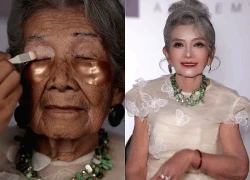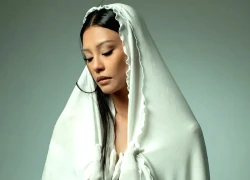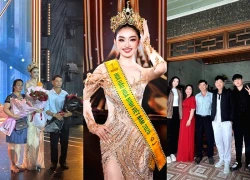Star's profile
· Vietnamese showbiz · Miss · Beautiful stars · Behind the scenes of the movieLuu Huu Phuoc: composing music imbued with the essence of the times, "national spirit" makes Vietnamese people "goosebumps"
Liu Huu Phuoc (SN 1921) is known as a great musician, author of one-time epics. His works are always associated with important historical events of the nation. From here, he was loved by many audiences.
Luu Huu Phuoc is a musician famous for his epic and liberation songs, associated with historical events of the Vietnamese nation. In addition to the stage name Luu Huu Phuoc, he also uses some other names such as: Huynh Minh Sieng, Long Hung, Anh Luu or Hong Chi. The late musician was born on September 12, 1921 in O Mon district, Can Tho province (now in Can Tho city).
As a child, his father taught him the piano, later played mandoline, guitar and taught himself music theory. In the late 1930s, he went to Saigon to study at Petrus Ky School. There, together with Huynh Van Tieng, Mai Van Bo, he founded the Scholar Club. This is considered a gathering place of patriotic students.
At the end of 1939, he composed the song "La Marche des Étudiants" and together with Mai Van Bo set the French lyrics to make the official song of the Club.
After passing the baccalaureate, from 1940 to 1944, Luu Huu Phuoc went to Hanoi to study at the School of Medicine and Pharmacy, under the University of Indochina. There, he went on to become one of the leaders of the Indochinese student political struggle movement.
During the organization of student resource activities, Luu Huu Phuoc has composed many famous songs, such as: "Non river brocade", Bach Dang Giang, Ai Chi Lang, Sing giang truong hatred (later renamed Soul of Martyrs), Sulk River Gianh, Ancients and Yan Hong Conference. The above songs are considered the pinnacle of the song genre historical talents, in order to instill national spirit for Vietnamese youth.
In 1944, Luu Huu Phuoc was assigned by the Viet Minh Front to go to the South to participate in revolutionary campaigning. At the same time, there was also a movement of a large number of students from the North - Central - South - to drop out of school to directly participate in revolutionary activities.
The quartet consisting of Luu Huu Phuoc, Huynh Van Tieng, Mai Van Bo and Dang Ngoc Tong in one night gathered to compose three songs: Tilt pen, Mau to Nam and Sow light to promptly cheer for this movement. The movement, later named Tilted Pen Stacking, lasted until the Revolution of August 1945.
In May 1946, Luu Huu Phuoc was deployed to Hanoi, taking on the task of establishing the Central Conservatory of Music (established in September 1946), after which he and the National Salvation Cultural Association evacuated to the resistance against the French in Vietnam.
The musical "Obscenity" composed by musician Luu Huu Phuoc was performed on March 21, 1943, at Hanoi Opera House. The musical "Picking flowers for Uncle" was performed on the occasion of the 60th anniversary of President Ho Chi Minh's birth. Musician Luu Huu Phuoc also composed a number of other operas such as: The Jade Rabbit, Killing the Lang Wolf, Breaking the Puppet Conspiracy, Two Humpback Guys ..
He has been awarded many medals and medals by the State of Vietnam, including the First Class Independence Medal in 1987, the 1st Ho Chi Minh Prize for Literature and Arts in 1996.
After 1975, he was awarded the rank of Professor and Academician of the Academy of Arts of the German Democratic Republic. His name is given to a Park in Ninh Kieu District, Can Tho City; The Senior High School in O Mon District, Can Tho City also bears his name.
Luu Huu Phuoc is considered one of the "leading" musicians of Vietnamese musicians. He represented Southern music at the beginning of the new music scene. He has become an author of brilliant, highly ideological, highly artistic value and historical value.
In addition to his role as a "musical historian", musician Luu Huu Phuoc also made great contributions to the revolutionary music of Vietnam. He participated in the establishment of Vietnam School of Music (now Vietnam National Academy of Music), School of Dance, School of Theater and Cinema, Vietnam Symphony Theater of Music and Ballet...
From February 1965, he served as President of the Liberation Arts Association, then Minister of Information and Culture of the Provisional Revolutionary Government of the Republic of South Vietnam.
After liberation, he continued to hold important positions such as Director of the Music Research Institute (1978–1989), President of the National Music Council, Member of the International Music Council, Chairman of the Committee on Culture and Education of the National Assembly,... During this period, he and his colleagues researched and introduced Khanh Son stone guitar - a unique musical instrument of the Raglai ethnic group in Khanh Hoa.
In terms of personal life, musician Luu Huu Phuoc and painter Trinh Kim Vinh were married by the Youth Union and the School of Fine Arts (where Ms. Trinh Kim studied at that time). During the marriage ceremony of Liu Huu Phuoc, the poet To Huu improvised 4 verses for him and his wife:
Fatherland is glorious, the family is happy Phuoc/ moving forward together, Mr. Phuoc and sister Vinh/ now love has met love/ join hands to protect peace stronger.
Ms. Trinh Kim Vinh once sent her three sons to her grandparents and accompanied the delegation across the Truong Son to live with her husband in the Cu Chi tunnels, working together in the Southern Liberation Front. She was wounded and taken to the North, when the reunification of the new country reunited her family.
Ms. Vinh is a painter, Associate Professor, and Distinguished Teacher. Previously, she taught at Ho Chi Minh City College of Fine Arts.
Musician Luu Huu Phuoc died on June 8, 1989, leaving many regrets in the hearts of Vietnamese fans. Up to now, the musical characteristics "imbued with the essence of the times", expressing the "national aura" in the songs of musician Luu Huu Phuoc still retain historical value.
"All his life he has been involved in the struggle for national liberation, his music has been present in the decisive turning points of the nation's destiny" as commented by musician Trong Bang, General Secretary of the Vietnam Musicians Association in the article Luu Huu Phuoc: The writer of revolutionary history with music published in Vietnam News Agency on September 8, 2012.
Y Nhi has a high hand, instigating Dao Hien laughing and making herself famous in front of Uncle Ho to help her receive 'brick to build a house'  Thư Kỳ12:24:49 03/08/2023If Y Nhi confidently ranked herself ahead of the two great men of the country in terms of popularity and was stoned, recently, 1st runner-up Dao Hien followed in the footsteps of Miss New when placing herself in front of even the leader. The beloved gathering of the Nation - President Ho Chi...
Thư Kỳ12:24:49 03/08/2023If Y Nhi confidently ranked herself ahead of the two great men of the country in terms of popularity and was stoned, recently, 1st runner-up Dao Hien followed in the footsteps of Miss New when placing herself in front of even the leader. The beloved gathering of the Nation - President Ho Chi...










 OgeNus: from a Korean trainee to a rap 'monster', a formidable opponent of ATSH!
OgeNus: from a Korean trainee to a rap 'monster', a formidable opponent of ATSH! Hoai An: About to get married but boyfriend left, now living with child not looking for a partner
Hoai An: About to get married but boyfriend left, now living with child not looking for a partner Hien Thuc: Teacher Phuong My Chi, U50, is known as "ageless beauty"
Hien Thuc: Teacher Phuong My Chi, U50, is known as "ageless beauty" Bui Lan Huong: The "lazy" muse suddenly became a "beautiful sister" phenomenon that thousands of people love.
Bui Lan Huong: The "lazy" muse suddenly became a "beautiful sister" phenomenon that thousands of people love. Phuong Ly: From "Phuong Linh's younger sister" to a female singer creating V-pop trends
Phuong Ly: From "Phuong Linh's younger sister" to a female singer creating V-pop trends Hoa Minzy: A journey of more than a decade from "Star Academy" to "Stars in the Army"
Hoa Minzy: A journey of more than a decade from "Star Academy" to "Stars in the Army" Pham Quynh Anh: After the love "scandal", her beauty has improved and she is attractive at the age of 40
Pham Quynh Anh: After the love "scandal", her beauty has improved and she is attractive at the age of 40 Ho Quang Hieu: Singer with a series of "big hits", happy with his wife 17 years younger
Ho Quang Hieu: Singer with a series of "big hits", happy with his wife 17 years younger New Miss Grand Vietnam 2025 Yen Nhi: Great education, mother sells lottery tickets, father is a construction worker
New Miss Grand Vietnam 2025 Yen Nhi: Great education, mother sells lottery tickets, father is a construction worker Thuy Duong: Business failed, now living in a rickety inn, remarried, with a pale pregnancy
Thuy Duong: Business failed, now living in a rickety inn, remarried, with a pale pregnancy
5 | 0 Discuss | Report